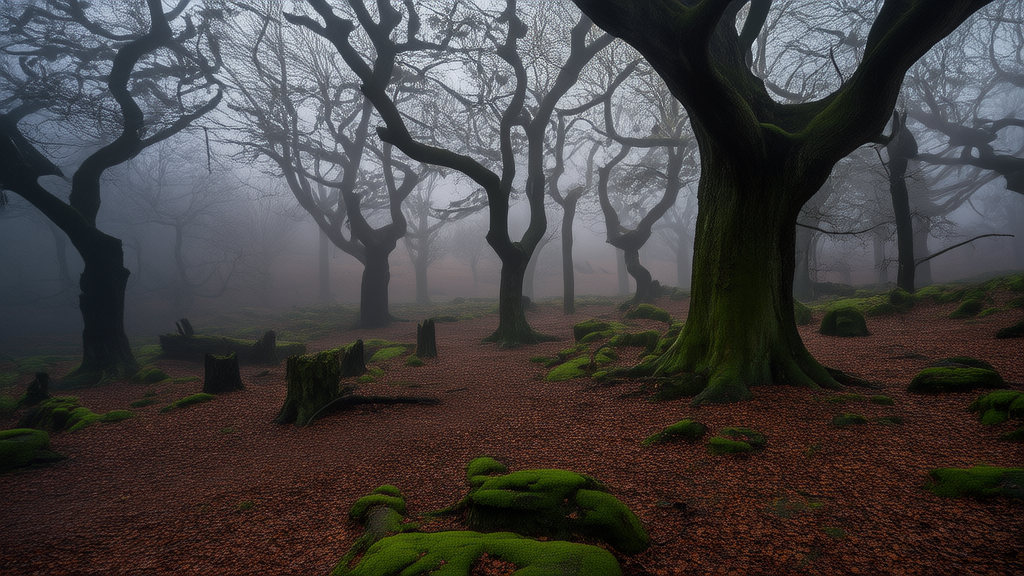🔮 Weird Tales & Urban Legends
Whispers in the Fog: The Vanishing of Elias Thorn and the Secrets of Black Hollow

The town of Black Hollow had always been quiet, nestled deep in the mountains where the fog clung to the earth like a second skin. It was the kind of place that people passed through on their way to somewhere else, never staying long enough to notice the subtle oddities. But for those who did stay, the whispers began early—stories of people vanishing without a trace, leaving behind only empty rooms and unanswered questions.
It started with the old miller, Elias Thorn. He was a man of few words, always seen walking the same path from his cottage to the mill, where he worked alone. One morning, the villagers found his door open, the floorboards slick with dew, but no sign of him. His tools were still in place, his boots by the door. No one saw him leave, and no one saw him return. The search party found nothing but a trail of footprints leading into the woods, which vanished just before the riverbank.
Then came the schoolteacher, Mira Lorne. She was known for her kindness and her habit of reading aloud to the children during recess. One afternoon, she left the classroom with a book in hand, promising to return soon. When she didn’t, the children waited, then the principal, then the entire town. Her desk was untouched, her coat still hanging by the door. A note was found in her drawer, written in her neat handwriting: “I have to go. Please don’t look for me.”
The disappearances grew more frequent. A baker named Henry Voss left his shop at dusk, saying he was going to check the ovens. His wife found the door locked, the ovens cold, and the flour still in the sacks. A fisherman named Tom Grisham was last seen casting his net near the lake, but the water was still, and the boat sat empty on the shore. Each time, there were no signs of struggle, no blood, no clues—just silence.
The townspeople began to avoid the woods, the river, and even the old mill. Some claimed they heard voices when the wind blew just right, or saw shadows moving where none should be. Others swore that the air felt heavier, as if the world itself was holding its breath.
A group of outsiders arrived one spring, drawn by the rumors. They were researchers, curious about the strange occurrences. They set up camp near the edge of the town, interviewing locals and taking notes. For a while, everything seemed normal. Then, one night, the camp was found empty. Tents were torn, equipment scattered, and the only thing left was a single journal, its pages filled with frantic scribbles. The final entry read: “They’re not gone. They’re waiting.”
The town council called for an investigation, but no one could explain what had happened. The police came and went, asking questions no one could answer. The people of Black Hollow began to live in hushed tones, avoiding the places where the disappearances had taken place. Children were warned not to wander too far, and the old mill was sealed off, its door nailed shut with a heavy chain.
But the most unsettling part was the absence of fear. There was no panic, no hysteria—only a quiet, unspoken understanding that something was wrong, and that it might not be fixed. People stopped talking about the disappearances, not out of forgetfulness, but because they knew that speaking of them might bring another one.
One evening, a young girl named Lila wandered into the woods, drawn by a strange melody that only she could hear. She followed the sound until she reached a clearing where the trees formed a perfect circle, and the ground was covered in silver moss. In the center stood a small stone archway, glowing faintly in the twilight. As she stepped closer, the melody grew louder, and the air around her shimmered like heat rising from the earth.
She turned back, but the path she had come from was gone. The trees had shifted, the sky had changed, and the world felt different, as if she had entered a dream that wasn’t hers. She called out, but her voice was swallowed by the silence.
In the end, no one ever found her. Not in the woods, not in the town, not anywhere. And though the people of Black Hollow moved on, they never quite forgot the feeling that something was still missing—something that had once belonged to them, and now was lost in the quiet spaces between the trees.
发布于 en
🔗
相关站点
- AI Blog — AI 趋势与技术新闻